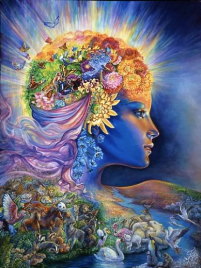The Yoga Wisdom of Corporate Personhood
By Chris Fici (Krishna Kisore Das) | Sep 07, 2012

As most of you probably know, the corporate entity is the most dominant “person” in the world today. Since an1866 decision by the United States Supreme Court gave corporations the same rights of personhood as natural persons under the equal protection clause of the Fourteenth Amendment, the corporation has come to dominate our global society.
In that same time frame, the idea of our collective natural ecology has been slowly depersonalized. Whereas many previous cultures and traditions viewed the environment as a mutual personality in harmony with the physical and spiritual aspirations of the people who lived upon the land, today the relationship between economy and ecology remains largely one of exploitation.
The entire human experiment on this planet now rests on whether we can reverse the tide of personalizing the corporation at the expense of depersonalizing the environment. If we cannot restore to our ecology the very rights of personhood we have placed on corporations, then none of our profits will be sustainable. Indeed, the very infrastructures of our society will not survive.
This is not to sound strident, or to discount the enlightened economics of many of our fellow readers here at Good-b, but there is a serious sense of urgency which must be confronted with all the courage and spirit we can muster.
In the bhakti-yoga tradition of India, of which I have been a practitioner now for over a decade, the sacred nature of personhood is at the essence of belief and practice. Every living being, and the collective fabric of life itself, is endowed with a personhood that is their very spiritual essence.
In the great Hindu classic The Bhagavad-Gita, it is said by Krishna that:
The humble sages, by virtue of true knowledge, see with equal vision a learned and gentle brāhmaṇa, a cow, an elephant, a dog and a dog-eater [outcaste].[1]
Without this vision, this anchor of the personality, then there is an emptiness in which emotion, reason, and devotion cannot enter. My own practice is helping me to rediscover the importance of seeing our world in the terms of the most intimate sense of the person. This has helped me to rediscover the bridge between my spirituality and the activist vision of the world I want to participate in.
Read more: http://good-b.com/?p=10438














